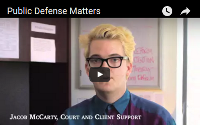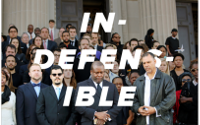Thoughts from Chief Defender Derwyn Bunton
"In all criminal prosecutions, the accused shall enjoy the right to a speedy and public trial ... and to have the Assistance of Counsel for his defense," the Sixth Amendment to the United States Constitution.
Recently the United States Supreme Court dismissed the case of Louisiana v. Boyer by a vote of 5-4. The case involved one of the most basic rights of due process – the above's right to a speedy trial and the effective assistance of counsel. At issue in Boyer was whether a state's failure to fund his counsel for five years should be weighed against the state for speedy trial purposes.
Fifty years after the landmark Gideon v. Wainwright ruling, the goal of equal justice under the law – embodied in the right to counsel – remains elusive at best. The Sixth Amendment right to counsel is jeopardized by a United States criminal justice system so lacking in funding for public defense that lawyers in public defender offices often qualify for public benefits. Ours is a system where public defenders (working a second job) encounter their clients while delivering pizza to them.
While the state of public defense funding is troubling in New Orleans, it is not a problem unique to New Orleans. Public defender offices across the state and country face increasing budget shortfalls and insufficient resources. Additionally, public defender caseloads regularly exceed professional and national standards for ethical representation. Neglecting the importance of adequately funded public defenders threatens the credibility and reliability of our criminal justice system, evidenced by 873 known exonerations between 1989 and 2012.
U.S. Attorney General Eric H. Holder Jr. said last year across the country, "public defender offices ... are underfunded and understaffed. Too often, when legal representation is available to the poor, it's rendered less effective by insufficient resources, overwhelming caseloads and inadequate oversight."
Cutting public defense hurts poor people, jeopardizes justice and undermines the credibility of the criminal justice system. Indeed, Justice Black, author of the Gideon decision, wrote in 1964, "There can be no equal justice where the kind of trial a man gets depends on the amount of money he has." A fair and just criminal justice system depends on both sides functioning adequately. Impairing the credibility and reliability of our criminal justice system places us all at risk. Public defense requires adequate, stable and reliable resources to function properly.
In a pointed dissent to the Court's inaction in Boyer, Justice Sonya Sotomayor wrote, "The Court's silence in this case is particularly unfortunate. Conditions of this kind cannot persist without endangering constitutional rights."
Justice is served when every person – rich and poor – has the effective assistance of counsel and can face his or her accuser equally in a court of law. That was the promise of Gideon. Public defenders fight every day to fulfill that promise, but until fully realized and supported at the state and federal level, situations such as Mr. Boyer's will not only continue, but grow more frequent. Today, justice remains in jeopardy and our whole system – our whole society – suffers.




